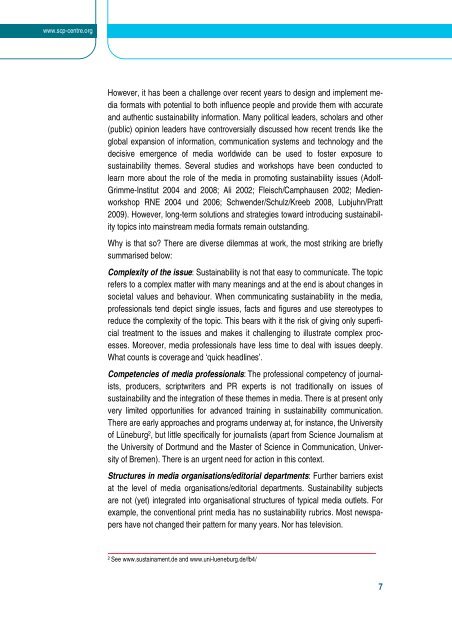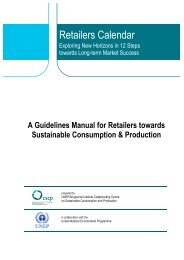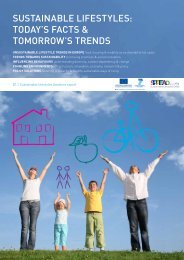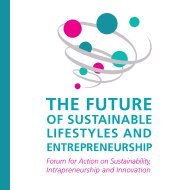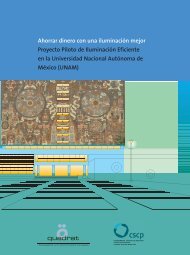integrating sustainability themes into media - Collaborating Centre ...
integrating sustainability themes into media - Collaborating Centre ...
integrating sustainability themes into media - Collaborating Centre ...
You also want an ePaper? Increase the reach of your titles
YUMPU automatically turns print PDFs into web optimized ePapers that Google loves.
www.scp-centre.org<br />
However, it has been a challenge over recent years to design and implement <strong>media</strong><br />
formats with potential to both influence people and provide them with accurate<br />
and authentic <strong>sustainability</strong> information. Many political leaders, scholars and other<br />
(public) opinion leaders have controversially discussed how recent trends like the<br />
global expansion of information, communication systems and technology and the<br />
decisive emergence of <strong>media</strong> worldwide can be used to foster exposure to<br />
<strong>sustainability</strong> <strong>themes</strong>. Several studies and workshops have been conducted to<br />
learn more about the role of the <strong>media</strong> in promoting <strong>sustainability</strong> issues (Adolf-<br />
Grimme-Institut 2004 and 2008; Ali 2002; Fleisch/Camphausen 2002; Medienworkshop<br />
RNE 2004 und 2006; Schwender/Schulz/Kreeb 2008, Lubjuhn/Pratt<br />
2009). However, long-term solutions and strategies toward introducing <strong>sustainability</strong><br />
topics <strong>into</strong> mainstream <strong>media</strong> formats remain outstanding.<br />
Why is that so? There are diverse dilemmas at work, the most striking are briefly<br />
summarised below:<br />
Complexity of the issue: Sustainability is not that easy to communicate. The topic<br />
refers to a complex matter with many meanings and at the end is about changes in<br />
societal values and behaviour. When communicating <strong>sustainability</strong> in the <strong>media</strong>,<br />
professionals tend depict single issues, facts and figures and use stereotypes to<br />
reduce the complexity of the topic. This bears with it the risk of giving only superficial<br />
treatment to the issues and makes it challenging to illustrate complex processes.<br />
Moreover, <strong>media</strong> professionals have less time to deal with issues deeply.<br />
What counts is coverage and ‘quick headlines’.<br />
Competencies of <strong>media</strong> professionals: The professional competency of journalists,<br />
producers, scriptwriters and PR experts is not traditionally on issues of<br />
<strong>sustainability</strong> and the integration of these <strong>themes</strong> in <strong>media</strong>. There is at present only<br />
very limited opportunities for advanced training in <strong>sustainability</strong> communication.<br />
There are early approaches and programs underway at, for instance, the University<br />
of Lüneburg 2 , but little specifically for journalists (apart from Science Journalism at<br />
the University of Dortmund and the Master of Science in Communication, University<br />
of Bremen). There is an urgent need for action in this context.<br />
Structures in <strong>media</strong> organisations/editorial departments: Further barriers exist<br />
at the level of <strong>media</strong> organisations/editorial departments. Sustainability subjects<br />
are not (yet) integrated <strong>into</strong> organisational structures of typical <strong>media</strong> outlets. For<br />
example, the conventional print <strong>media</strong> has no <strong>sustainability</strong> rubrics. Most newspapers<br />
have not changed their pattern for many years. Nor has television.<br />
2 See www.sustainament.de and www.uni-lueneburg.de/fb4/<br />
7


